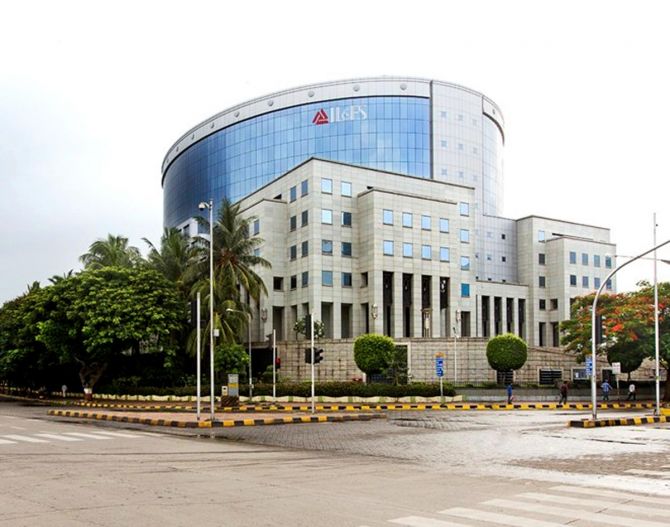If raters get away by moving from AAA to D overnight after companies default, as happened with DHFL, YES Bank, RCom, and IL&FS, it shows a complete breakdown in the rating system. It calls for exemplary punishment, not kid glove treatment, says Debashis Basu.

Recently, HDFC Bank had to put out a public notice that it will refund the GPS device commission it had earned from auto loan customers who bought the device as part of auto loan funding during FY14 to FY20.
The notice said: 'The refund will be credited to the customer's repayment bank account as registered with the bank.'
If the bank account is closed, customers are requested to contact the bank from their registered e-mail ID or call on a number within the next 30 days.
If you have not been following the HDFC Bank auto loan mis-selling case, here is what the Reserve Bank of India did: One, it investigated a whistleblower complaint to its logical conclusion and found that HDFC Bank had forced customers to purchase a vehicle-tracking device for four years till December 2019; two, it imposed a penalty of Rs 10 crore on HDFC Bank for deficiencies in regulatory compliance last month; and three, it made the bank disgorge illegitimate commissions, as mentioned above.
Earlier, in December 2020, the RBI had asked HDFC Bank to halt the launch of all new digital programmes and onboarding new customers for its credit card business until further orders. For the first time in many years, the RBI is indeed acting like a tough sheriff.
Now contrast this with regulatory action in the securities market.
One of the most egregious recent cases of misconduct is the behaviour of credit-rating agencies. YES Bank AT1 Bonds, DFHL, and IL&FS all sported AAA or AA+ ratings just months before they went bust.
A fortnight before IL&FS went bust in September 2018, the rating-agencies India Ratings, ICRA, and CARE had all given its debt papers AAA/AA+ ratings, even when its subsidiary, IL&FS Transport Networks, had defaulted in June the same year.
Investors looking for safe investment have lost billions of rupees due to the ratings. And yet, the Securities Appellate Tribunal (SAT) seems to think this is simple carelessness.
Recently, SAT reduced the penalty imposed by the Securities and Exchange Board of India on CARE Ratings from Rs 1 crore (Rs 10 million) to Rs 10 lakh (Rs 1 million) in a case related to lapses in assigning a credit rating to non-convertible debentures of Reliance Communications (RCom).
SAT felt this was a case of 'lack of due diligence for not having acted in a timely manner ... the maximum penalty of Rs 1 crore is highly excessive, harsh and arbitrary and (is) not commensurate with the violation'.
After all, it is not that the ratings were not downgraded, pointed out SAT, 'but not in a timely manner. There could be a case of carelessness or sluggishness or laxity ... but it is not a case of oversight'.
This absurd order is exactly why financial misdemeanours are flourishing. Independent and timely ratings are the cornerstone of the debt market. Raters are paid by companies they rate and so there is already a conflict of interest in their relationship.
A timely rating upgrade or a downgrade is the only job raters have. Being late with that job shows dereliction of duty, not mere oversight. Millions of investors rely on ratings as the principal means of making their investment decisions.
If raters get away by moving from AAA to D overnight after companies default, as happened with DHFL, YES Bank, RCom, and IL&FS, it shows a complete breakdown in the rating system. It calls for exemplary punishment, not kid glove treatment.
With judgments like these, market intermediaries would feel emboldened and the next scam would be bigger and more egregious. There have been cases where Sebi's own investigation and orders have been weak, but this is worse.
Enforcement: New paradigm needed
As I have written several times, scams, misconduct, and misdemeanour happen with high regularity, not because these are inevitable, but because the price of getting caught is insignificant. For gross mis-selling, the insurance regulator imposes a few lakh rupees as penalty.
Although five financial regulators were specifically set up to stop this mischief, aggrieved investors let down by regulators run from the police to already clogged courts to seek redress.
If policymakers want to change any of these, they need to look at four aspects of enforcement.
1. Outcome: Regulation needs to be focused on outcome -- for a financial crime, the principal outcome recovery of money or disgorgement of unlawful gains, apart from an exemplary penalty to act as a strong deterrent.
Right now it is arrest, interrogation, and jail without bail. It fetches us nothing remedial for those affected and litigation drags on endlessly.
2. Pin individual responsibility: In each case of proven malfeasance, individual officers, including reporting bosses, should be personally penalised to ensure that the next time the senior management at banks order something irregular, employees resist it. Sebi has tried to do this in many cases.
3. Whistleblower rewards: ICICI Bank's bad loans to the Videocon and other groups, IL&FS's issues (which the board ignored), the NSE algo scam, and the HDFC Bank case all became public due to whistleblowers.
Even if a regulator is proactive, there is only so much it can discover on its own. The number of cases that come up on its radar would be minuscule.
Having an effective whistleblower mechanism with rewards, like in the US, would be useful. The Indian revenue authorities have one too.
4. Standardise: The RBI is all powerful. Its orders are rarely challenged. There is no appellate structure other than courts. The securities market and insurance have SAT overseeing their decisions and Sebi has been rendered toothless by several of SAT's recent decisions.
It is worthwhile examining whether to have the RBI model for the securities market.
Of course, the question always is who will examine and make these changes. These issues come to light when there is a scam, which affects a small number of people. So, there is no public pressure, which alone moves politicians.
Only if policymakers on their own intend to make the system fair for the last common person can we expect some changes.
Until then it is open season for crooks in the securities market.
Debashis Basu is the editor of www.moneylife.in.











 © 2025
© 2025